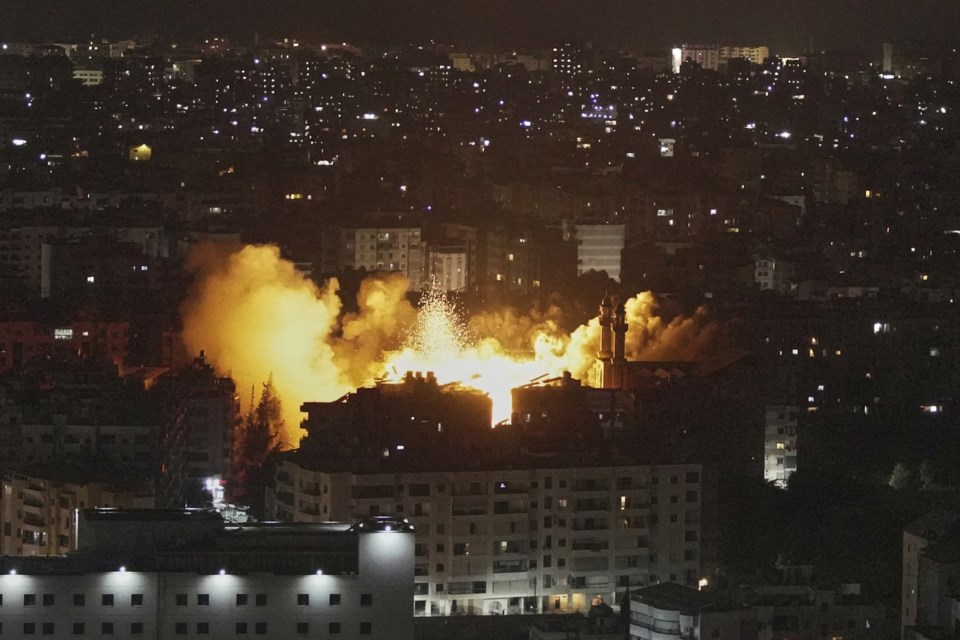BEIRUT (AP) ã The Israeli military struck several sites in Beirutãs southern suburbs that it said held underground facilities used by Hezbollah for drone production Thursday, on the eve of the Eid al-Adha holiday.
The strikes marked the first time in more than a month that Israel had struck on the outskirts of the capital and the fourth time since a US-brokered ceasefire agreement ended the latest war between Israel and the Lebanese militant group Hezbollah in November.
Israel posted a warning ahead of the strikes on X, formerly known as Twitter, announcing that it would hit eight buildings at four locations.
Israel has continued to carry out near-daily strikes in southern and eastern Lebanon since the ceasefire, which Lebanon has said are in violation of the agreement. Israeli officials say the strikes are intended to prevent Hezbollah from regrouping after a war that took out much of its senior leadership and arsenal.
The Israeli army said in a statement that Hezbollah was ãworking to produce thousands of drones under the guidance and financing of Iranian terrorist groups.ã
Hezbollah ãused drones extensively in its attacks against the State of Israel and is working to expand its drone industry and production in preparation for the next war,ã the army statement said.
There was no immediate statement from Hezbollah.
A Hezbollah official denied that there were drone production facilities at the targeted locations.
ãIn the (ceasefire) agreement, there is a mechanism for investigating if there is a complaint,ã the official said. ãIsrael in general, and Netanyahu in particular, wants to continue the war in the region.ã
A Lebanese army official said the army had attempted to convince Israel not to carry out the strikes and to instead let Lebanese officials go in to search the area under the mechanism laid out in the ceasefire agreement, but that the Israeli army refused, so Lebanese soldiers moved away from the locations. Israeli army officials could not immediately be reached for comment.
Both Lebanese officials spoke on condition of anonymity because they were not authorized to speak publicly.
Lebanese President Joseph Aoun and Prime Minister Nawaf Salam condemned the strikes.
Aoun in a statement called them a ãblatant violation of an international agreement, as well as the basic principles of international and humanitarian laws and resolutions, on the eve of a sacred religious occasionã and said it demonstrates Israel's ãrejection of the requirements of stability, settlement and just peace in our region.ã
He accused Israel of using Lebanon as a ãmailboxã to send a message to the United States. He did not elaborate. Washington has been negotiating with Iran - Hezbollah's longtime backer - for a deal over Tehran's nuclear program and has warned Israel not to strike Iran in the meantime.
Israeli Defense Minister Israel Katz in a statement praised the Israeli air force for ãperfect executionã of the strikes and said Israel will ãcontinue to enforce the ceasefire rules without any compromise.ã He said Israel holds the ãLebanese government directly responsible for preventing violations of the ceasefire and all terrorist activity against the state of Israel.ã
The conflict between Hezbollah and Israel began on Oct. 8, 2023 when the Lebanese militant group began launching rockets across the border in support of its ally, Hamas, in Gaza. Israel responded with airstrikes and shelling and the two were quickly locked in a low-level conflict that continued for nearly a year before escalating into full-scale war in September 2024.
It killed more than 4,000 people in Lebanon, including hundreds of civilians, while the Lebanese government said in April that Israeli strikes had killed another 190 people and wounded 485 wounded since the ceasefire.
There has been increasing pressure on Hezbollah - both domestic and international - to give up its remaining arsenal, but officials with the group have said they will not do so until Israel stops its airstrikes and withdraws from five points it is still occupying along the border in southern Lebanon.
Abby Sewell, The Associated Press



